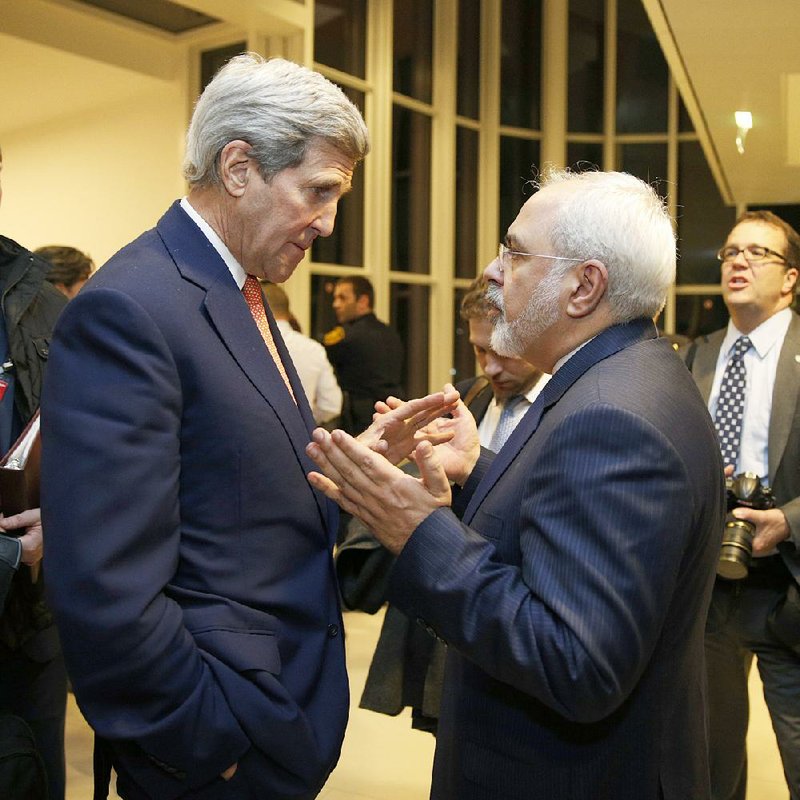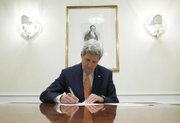VIENNA -- The U.N. nuclear agency certified Saturday that Iran has met all of its commitments under last summer's nuclear deal, crowning years of U.S.-led efforts to crimp Iran's ability to make atomic weapons. For Iran, the move lifts Western economic sanctions that have been in place for years, unlocking access to $100 billion in frozen assets and unleashing new opportunities for its battered economy.
RELATED ARTICLE
http://www.arkansas…">Iran, U.S. exchange detainees
U.S. Secretary of State John Kerry and the top diplomats of Iran and the European Union hailed the accord, reached after years of setbacks and a full decade after the start of international diplomacy aimed at reducing the possibility that Tehran could turn its nuclear programs to weapons making.
"Today marks the first day of a safer world," Kerry declared in Vienna. "This evening, we are really reminded once again of diplomacy's power to tackle significant challenges."
Additionally, Kerry linked the trust built between Iran and the United States over the past two years of talks to the release by Iran on Saturday of four Americans who also hold Iranian citizenship.
"Thanks to years of hard work and committed dialogue," he said, "we have made vital breakthroughs related to both the nuclear negotiations and a separate long-term diplomatic effort" that led to the freeing of the Americans.
EU foreign-policy chief Federica Mogherini -- in a statement also read in Farsi by Iranian Foreign Minister Mohammad Javad Zarif -- said the accord "demonstrates that with political will, perseverance, and through multilateral diplomacy, we can solve the most difficult issues and find practical solutions that are effectively implemented."
In Washington, President Barack Obama signed executive orders lifting economic sanctions on Iran, while Kerry confirmed that the U.N.'s International Atomic Energy Agency could verify that "Iran has fully implemented its required commitments."
Agency inspectors inside the country "verified that Iran has carried out all measures required ... to enable Implementation Day to occur," agency Director General Yukiya Amano said in a statement issued just before midnight Vienna time. Amano will travel to Iran today.
The July 14 deal, struck after decades of hostility, defused the likelihood of U.S. or Israeli military action against Iran while creating an opening for future cooperation on calming the tumultuous Middle East. But proof that it had been fully implemented had been lacking until Saturday.
For Tehran, the report translates into a financial gain while also helping its efforts to rehabilitate its international image.
Beyond the lifting of sanctions and the unlocking of frozen assets, certification by the International Atomic Energy Agency opens the path to new oil, trade and financial opportunities that could prove far more valuable for Tehran in the long run.
Not even waiting for the agency report, Iranian Transport Minister Abbas Akhondi said his country had reached a deal with the European consortium Airbus to buy 114 passenger planes once the sanctions are lifted.
Among the sanctions lifted will be those imposed between 2006 and 2010 by the U.N. Security Council as it attempted to pressure the Islamic Republic to curb uranium enrichment and other activities that could be used for nuclear weapons. Iran sees that move and the recent closure of a decade-long investigation of whether it worked on such weapons as a formal end to the allegations against it.
But the deal is also a boon for the White House, helping turn tensions into a first step toward cooperation with Iran, a major regional power instrumental for ending the Syrian conflict and other Middle East crises.
The deal with six world powers puts Iran's various nuclear activities under International Atomic Energy Agency watch for up to 15 years, with an option to reimpose sanctions should Tehran break its commitments.
It aims to increase the time Iran would need to make enough fissile material for a nuclear weapon from several months to a year, primarily by capping Tehran's ability to enrich uranium, which can create material ranging from reactor fuel to warhead material. Under the deal, Iran committed to reduce its operating centrifuges enriching uranium by two-thirds, to just over 5,000 machines.
The agency report, obtained by The Associated Press, ticked off that commitment and others as met.
U.S. non-nuclear sanctions related to terrorism and other Iranian activities remain in place. Lawmakers have called for additional American restrictions on Iran for test-firing ballistic missiles in October and November in apparent violation of the U.N. sanctions.
The Airbus deal includes a mix of new and used jets from the A320 and A340 lines, an Iranian official said, declining to be named as the details are private. The A340 is no longer in production. The purchases are expected to be completed after the sanctions are officially gone, with the first deliveries due as early as July, he said.
Airbus declined to comment on any discussions with Iran Air.
"When the Iran sanctions are lifted, Airbus Group is ready to support Iranian civil and para-public transportation sector development in strict compliance with all international laws (US, EU and UN sanctions and embargoes), " a spokesman for Toulouse, France-based Airbus said in an emailed statement. Para-public transportation refers to helicopters used by police and border-control agencies.
Iran also is interested in Airbus wide-body planes including A350s and the A380 double-decker as it seeks to add destinations in the U.S., Canada, Australia and Europe to directly serve the Iranian population scattered there rather than connecting through Dubai or Istanbul hubs, the official said.
Iran also is considering the Boeing Co. 737 narrow-body jet to serve the domestic market and twin-aisle 777s for long-haul routes, the official said. It's also looking at smaller planes from Bombardier Inc. and Embraer SA. A Bombardier spokesman couldn't be reached immediately for comment.
The Embraer press office said the company will be ready for discussions when sanctions are lifted.
Information for this article was contributed by George Jahn, Bradley Klapper, Ali Akbar Dareini and Josef Federman of The Associated Press; by Carol Morello and Karen DeYoung of The Washington Post; and by Deena Kamel Yousef, Randall Woods and Robert Tuttle of Bloomberg News.
A Section on 01/17/2016

